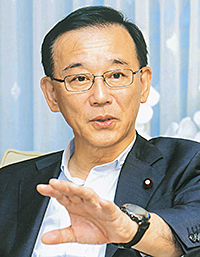
Interviews with new Party officers - Secretary-General Sadakazu Tanigaki
The new LDP leadership that was approved by the General Council on September 3 represents a new start with a team that brings both balance and strength to the table. At the Extraordinary Meeting of the Board, Secretary-General Sadakazu Tanigaki expressed a strong ambition to "be unified in support of the government and create structures that work for the people." The Abe government has gotten off to a new start with high expectations , and we asked him about how the new LDP leadership will approach Party administration, bring consensus to debate within the Party, and deal with policy challenges.
Q: Tell us about your ambition and resolve as Secretary-General.
Secretary-General Sadakazu Tanigaki: We spent three years and three months out of power, and then, under the leadership of Party President Shinzo Abe, were restored to ruling party status.
In the one year and eight months since reclaiming the government, Prime Minister Abe has engaged in globally-oriented diplomacy and visited numerous countries around the world. He has also been undertaking the bold economic policies of "Abenomics" and is achieving steady results.
We are keenly aware of how deeply disappointed the Japanese people were with the disarrayed policy decisions-of the DPJ government. The LDP believes it is important that decisions be made after a thorough debate of the issues, and once they are made, that they be respected and that everyone supports the Abe government in carrying them out.
As Secretary-General, I believe it is my responsibility to foster unity to support the Abe government and, as the leading party in the coalition, address the numerous challenges that confront us.
The single-seat district system in the House of Representatives is often described as "enabling governments to change." In reality, however, as we look at the debate on the "right of collective self-defense," for example, the opposition parties lack clear identity, and it seems to me that the Japanese people increasingly expect the LDP to act as the responsible ruling party.
Q: What are you doing to prepare for the upcoming local elections?
Tanigaki: I believe it is crucial for us to win local elections and not just the national elections, so we can bring greater stability to politics.
My ultimate mission is to achieve results in the nationwide local elections scheduled for next spring. The gubernatorial elections coming up before the year's end in Fukushima and Okinawa will be particularly important stepping stones in this endeavor.
In the Fukushima gubernatorial election, we need to create structures and systems that will gain support as the prefecture rebuilds from the nuclear accident that followed the Great East Japan Earthquake.
In the Okinawa gubernatorial election, we will need to deal with the special circumstances in the prefecture due to the close relationship between the "revitalization of the local economy" and the "bases issue" within the context of security.
These elections will be tough, and it will be crucial to have broad coordination throughout different spheres of life and different levels of society.
Q: How do you plan to reflect the opinions of outlying areas in policy?
Tanigaki: When I was Party President, we started the "National Town Hall Meeting Caravan " as a way to listen to frank and unvarnished opinions from outlying areas. On September 10, we held our 600th session.
These are small gatherings with locals to hear about issues of common concern throughout the country - everything from the damage that birds and animals do to crops to the lack of accessible gynecologists.
In the latest Cabinet shuffle, new post of "The Minister in charge of Overcoming Population Decline and Vitalizing Local Economy in Japan" was created. The Party will continue to work in close cooperation with strong local organizations to ensure that local voices are reflected in policy and Party administration. I plan to assign Party officers and Cabinet Ministers on this mission.
Q: What do people look for in the Party and lawmakers? What are the policy challenges on the horizon?
Tanigaki: The government listens to the opinions of experts and makes use of bureaucratic structures to formulate and execute policy, but it is the lawmakers who have the opportunity to encounter the people on a day-in-day-out basis, and it is our job to ensure that policy reflects these "grassroots voices" that may not be heard by the bureaucracy.
That way, the policies of the Party need to complement the policies of the government and the "National Town Hall Meeting Caravan" is an essential tool for that.
It is also important that the Party embark on a foreign policy that will improve relations with our neighbors and ensure that these relationships are "well ventilated."
With respect to "Abenomics," the Party must ensure that the effects are felt in every corner of the country.
The law has set a course for increasing the consumption tax to 10%, but the economy is a living organism, and we must take that into account as we make decisions.
Recovery from the earthquake is still in progress, and there have been some positive developments. For example, Fukushima informed Prime Minister Abe that it would agree to the construction of an intermediate storage facility. It is important, however, that we accelerate our efforts to assist victims.
Q: How do you plan to deal with the opposition parties in the upcoming extraordinary session of the Diet?
Tanigaki: During the debate on the "right of collective self-defense," I felt very keenly the need to have the "understanding of the people" on security issues as we work through the Diet agenda. Regardless of the issue, our answers must be acceptable and convincing to the people. As we go forward, we will engage in careful, painstaking, thorough debates with the opposition parties, but we may also need to express our commitment and resolve as the ruling party.










